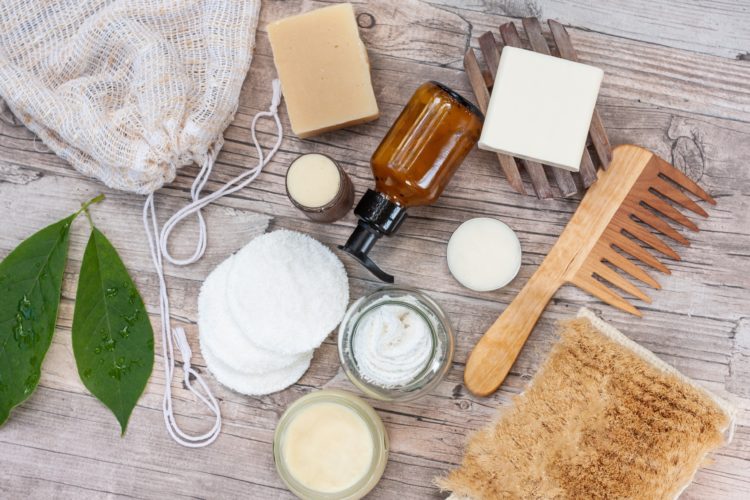Gone are the days when natural cosmetics meant that you had to deal with straw hair, non-functional deodorants and sun creams that made you look like a Japanese geisha. The demand for biodegradable products from fair production has been increasing for years - and with it the pressure on companies to create better products.
In recent years, I have gradually switched my entire bathroom cabinet to plastic-free packaging, solid shampoos and soaps and sustainable natural cosmetics and I am now more than satisfied with every product. In terms of travel, Zero Waste cosmetics make things even easier: they usually last much longer than conventional products, take up less space and are more practical to use.
Here are my favorites for a sustainable cosmetic bag when traveling or in the bathroom at home.
Mineral sunscreen
One of the most important products when it comes to switching from conventional cosmetics to natural cosmetics is sun cream. One reason for this is that many natural cosmetic products still leave an extremely white film on the skin and can hardly be rubbed in. If you get the wrong product, this can immediately put you off again. On the other hand, there is hardly a product where the switch to the natural variant would be more important, as you can eradicate entire animal and plant species with chemical filters.
Chemical filters in sunscreens gradually wash off in the sea, destroying sensitive coral reefs and micro-organisms in the water. The situation is so dramatic that first countries are now banning conventional sunscreen on the beach. Also in the Mexican Cenotes it is forbidden to swim with sun cream on your skin.
Glücklicherweise gibt es inzwischen tolle Alternativen, die Dich mit mineralischen Filtern, wie Zinkoxid, schützen und trotzdem keinen weißen Film auf Deiner Haut hinterlassen.
Solid shampoo and soap
What a struggle it was a few years ago to find a shampoo that could be used in one piece without plastic packaging. Mostly I could only find hair soaps that left my hair half strawy, half greasy. Nowadays you can find dozens of solid shampoos in every drugstore, which do not differ in their effect from conventional products. My shampoo from Alverde costs just five euros, lasts at least a month and is a tiny little bar of soap that is easy to carry on your travels in a sisal soap bag or a stainless steel box. It takes up as much space as a conventional mini-shampoo, which is used up after three hair washes at the latest.
With body soap the whole thing is even easier. But especially if you have dry skin, make sure you buy a soap-free wash instead of a real soap. They are much less aggressive and behave on the skin like a normal shower gel.
The advantage of solid soap and shampoo: they can neither leak in your backpack nor produce packaging waste and they are much more space-saving and durable. Since solid products are almost always natural cosmetic products, you also avoid allergenic or hormone-like substances that mess up your body's balance.
Allrounder: coconut oil
With a small glass of coconut oil you are prepared for almost any situation, even when travelling. No matter whether it's for morning oil pulling, as a hair treatment or even as insect repellent - hardly any product is more versatile in the bathroom (and in the kitchen) than coconut oil. Contrary to popular belief, however, oil has a cleansing rather than a caring effect. So if you want to use it on your face, use it as a substitute for your washing lotion rather than as a face cream.
Deo cream
Admittedly, it was a long way until I found natural cosmetic products that I am really satisfied with. My deo was one of these problem cases. In the colder seasons, it may not be a problem that in most pack-friendly, natural deodorants there is no aluminium - but in summer or when doing sports, I had the feeling that I needed a more reliable product. In the meantime I have found a deo cream with which I am completely satisfied. The small metal can from Greendoor lasts almost forever, contains only natural ingredients and keeps dry even during a 10-kilometer run in midsummer.
Facial care
When it comes to facial care, many people still think that a lot helps a lot. The opposite is the case. Even for severe skin problems like acne or rosacea, it is quite sufficient - and even recommended - to wash the face with water only. Dirt and sebum can easily be washed away with a washcloth or a Konjac sponge without the need for further cosmetics. If you like to use toner, you can also simply use 100% rose water - this neutralizes your skin just as well as any other facial toner.
For facial care, as a cream, you can use pure shea butter, which provides your skin with both moisture and fat. If it is too firm for you, simply heat it briefly in the microwave and the consistency will remain permanently creamy.
By the way, the appearance of your skin is largely influenced by your diet, your lifestyle and your hormones (which also depend on diet and lifestyle) and hardly by what you would like to transport into your skin with your daily care. Washing and a simple face cream are therefore quite sufficient if you otherwise lead a reasonably skin-friendly life.
Shaving
A razor may look a little dangerous at first and admittedly, you have to be a little more careful in its use than with conventional razors if you do not want to hurt yourself. However, at around 10 cents a piece, the blades are significantly cheaper than comparable plastic products and you are also protecting the environment.
Dental care
Even if you - like me - are not a fan of manual toothbrushes and therefore a bamboo toothbrush is out of the question, there are now alternatives for a waste-free bathroom. The electric toothbrushes from Happybrush are made of 100 percent recyclable material. This is better than ordinary plastic toothbrushes. After all, the bristles of the bamboo toothbrushes are not zero waste either. As a replacement for the toothpaste tube, you can choose between solid toothpaste on the stick or toothpaste tabs, depending on what you prefer. Both are dissolved in water and then used like regular toothpaste - a little extra step to avoid plastic.
Make-Up
Since I no longer own any make-up myself, I am unfortunately unable to judge how well natural cosmetics do their job in this area. The only thing I use regularly is mascara and for that it might be almost the most difficult to find a good alternative. Mascara made from natural ingredients will probably never last as well or tint as intensively as conventional cosmetics - but almost. I am absolutely satisfied with my mascara from Alverde. Especially mascaras are full of hormonal and cancer-causing substances that quickly enter your body.
Tampons & Co.
Conventional tampons are not only bad for the environment, they are especially harmful to your body due to the proven excessive amounts of pesticides in their cotton. Meanwhile there are many alternatives made of organic cotton, which do not use chemicals in their production and are also produced fairly. Moreover, these products are usually 99% biodegradable. If you take Zero Waste seriously, you will just switch to the menstrual cup. This takes up the least amount of space when traveling and can be easily washed out after each use.
Advantages of natural cosmetics
Once you have started to deal with the topic of natural cosmetics, you will not want to go back to conventional cosmetics. Natural cosmetics have no disadvantages whatsoever when you have finally found the right products for you - but there are a lot of advantages.
Natural cosmetics aren't expensive
As in conventional cosmetics, there are of course expensive and less expensive brands. However, you will find that expensive does not necessarily mean better when you look through the list of ingredients. At Codecheck you can easily find out which ingredient is hidden behind which name and whether it is harmless to health.
In principle, thanks to their consistency, natural cosmetics usually last much longer than conventional cosmetics, which in the end makes up for a slightly higher price.
You protect animals and environment
Due to natural ingredients, natural cosmetics naturally release far fewer harmful substances into the environment, the sea and waste water than conventional cosmetics. However, natural cosmetics does not automatically mean that they are free of animal testing. In principle, this should be the case - but as always, there are loopholes that companies can exploit. If you want to be on the safe side, find out what the respective seal on a product means and check whether or not a particular brand commissions animal testing.
You protect yourself
Infertility, skin problems, allergies and even cancer - these are just some of the consequences that conventional cosmetic products can cause. While initial problems, such as rashes, are immediately noticeable, long-term damage is hardly attributable to individual products and is therefore often ignored. However, many hormone-like and cancer-causing substances accumulate in our cells over the years and lead to more and more symptoms of failure. A disturbed hormone balance leads to countless, unspecific problems, especially in women, and most of them are caused by toxins in food and cosmetics.
Of course we will never be able to eliminate all environmental toxins or risks from our daily lives unless we want to live under a plastic bell (which wouldn't be very sustainable either), but some easily implementable changes, such as those in the cosmetics sector, should not be a problem for anyone.
Toxic ingredients in cosmetics
The following ingredients are particularly dangerous, not only for your own body, but also for the environment. They are therefore prohibited on the beaches of Palau, Hawaii and Florida from this year onwards - not only in sunscreen, but also in shampoo, conditioner and co.
- Oxybenzone (Benzophenone-3)
- Octinoxate (Octyl Methoxycinnamate)
- Octocrylene
- 4-Methyl-Benzylidene Camphor
- Methyl Paraben
- Ethyl Paraben
- Butyl Paraben
- Benzyl Paraben
- Triclosan
- Phenoxyethanol
At best, these substances should not be present in any of your cosmetic products.
Special tip: Even if you would like to radically reduce the amount of waste in your bathroom now - simply throwing away full products is also anything but sustainable. If you no longer want to use some of them yourself, you're sure to find someone in your friends circle who are not yet interested in the topic of sustainability and who would be happy to have your remaining stock.
Zero Waste by the way harmonizes perfectly with minimalist traveling. You can find my tips here.


One Comment